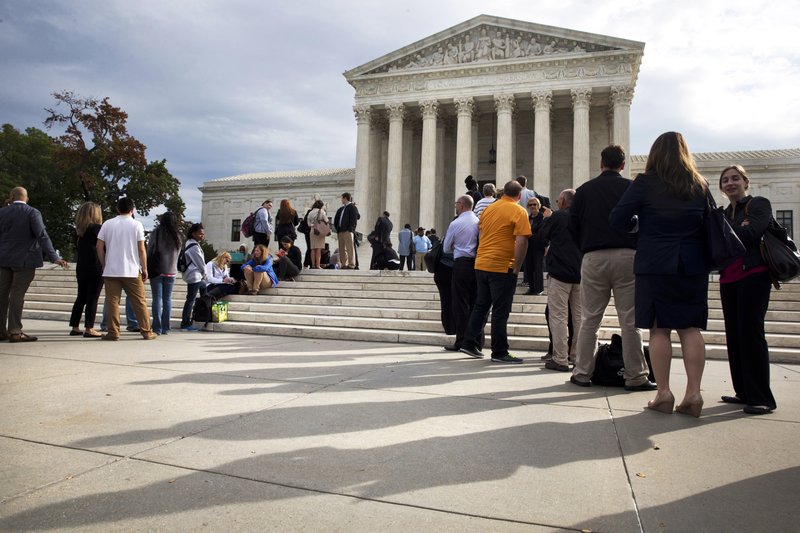More than 1,000 prison inmates across the country, some behind bars more than 50 years for murders they committed as teenagers, will get a chance to seek their freedom under a U.S. Supreme Court decision announced Monday.
The justices voted 6-3 to extend an earlier ruling from 2012 that struck down automatic life terms with no chance of parole for teenage killers. Now, even those who were convicted long ago must be considered for parole or given a new sentence.
The court ruled in favor of Henry Montgomery, who has been in prison more than 50 years for killing a sheriff's deputy at age 17 in Baton Rouge in 1963.
Justice Anthony Kennedy, writing the majority opinion, said that "prisoners like Montgomery must be given the opportunity to show their crime did not reflect irreparable corruption; and if it did not, their hope for some years of life outside prison walls must be restored."
Kennedy said states do not have to go so far as to resentence people serving life terms. Instead, states can offer parole hearings, with no guarantee of release if inmates fail to show that they have been rehabilitated.
Louisiana is among seven states that had refused to apply the Supreme Court's 2012 ruling to about 1,200 inmates who may now qualify for parole hearings. Alabama, Colorado, Michigan, Minnesota, Montana and Pennsylvania are the other states, according to public interest law firms that advocate on behalf of inmates.
According to the state Public Defender Commission, Arkansas has 56 inmates who, as teenagers, received mandatory sentences of life without parole.
Last June, the Arkansas Supreme Court ruled that Ulonzo Gordon would get a chance for resentencing in Crittenden County Circuit Court. Gordon was 17 at the time he was involved in the 1995 murder of a West Memphis man. But movement on resentencing was held up while the state attorney general's office petitioned the U.S. Supreme Court for a writ of certiorari clarifying whether Arkansas should retroactively apply the rulings on mandatory life sentences without parole for juveniles. The petition is still before the nation's high court, the attorney general's office said Monday.
Monday's decision does not expressly bar judges from sentencing teenagers to a lifetime in prison. But the Supreme Court has previously said such sentences should be rare, and only for the most heinous crimes.
In dissent, Justice Antonin Scalia said the ruling "is just a devious way of eliminating life without parole for juvenile offenders." Justices Samuel Alito and Clarence Thomas joined Scalia's dissent.
Four years ago, in a case called Miller v. Alabama, the justices struck down automatic life sentences with no chance of release for teenage killers. But the court did not say at the time if that ruling applied retroactively to Montgomery and other inmates like him, whose convictions are final.
In the 5-4 decision from 2012, Justice Elena Kagan wrote for the majority that judges weighing prison terms for young offenders must take into account "the mitigating qualities of youth," among them immaturity and the failure to understand fully the consequences of their actions.
Chief Justice John Roberts dissented from the 2012 decision barring automatic life sentences for young killers, but he joined the majority on Monday along with Justices Stephen Breyer, Ruth Bader Ginsburg, Sonia Sotomayor, Kennedy and Kagan.
The Arkansas Supreme Court ruling in June paved the way for other inmates to move forward with resentencing hearings in circuit courts, Gordon's attorney, Jeff Rosenzweig, said. He said this put Arkansas ahead of the federal courts' new rule.
"The states were choosing up sides," Rosenzweig said of the retroactivity question. "Now, it's clear that it's retroactive. Therefore, it's just an additional confirmation that we'd already won. ... It appears that the Legislature could just legislate something saying all these people who are covered are eligible for parole or eligible after a certain amount of time."
Gregg Parrish, the head of the Arkansas Public Defender Commission, said he and other attorneys have been in discussions with the governor's office and others since the June 2015 ruling by the Arkansas Supreme Court.
Parrish said he can see "positives" to either letting the inmates go through the courts or by involving the Arkansas Legislature to make the offenders eligible for parole hearings.
Parrish's group is responsible for most of the ongoing appeals that have been on hold since the Arkansas attorney general's office petitioned the U.S. Supreme Court to reconsider Gordon's case.
That petition, Parrish said, might be moot now, meaning his office will have to start preparing for resentencings.
"Obviously if the state follows the lead of the suggestion of the [U.S.] Supreme Court and makes them all eligible for parole, then you're going to take this out of the court system. ... You'll have a cost factor there," Parrish said. "But if the Legislature proposes legislation to make them eligible for parole then there would be no need for resentencing. That would be their remedy."
The chairman of the House Judiciary Committee, Rep. Matt Shepherd, R-El Dorado, said he hadn't had a chance to digest the U.S. Supreme Court ruling.
The head of the Senate Judiciary Committee, Jeremy Hutchinson, R-Little Rock, said there is no set plan going forward but he thinks that a legislative fix is possible.
Gov. Asa Hutchinson was out of town Monday, but a spokesman said the office had no comment until staff can evaluate the U.S. Supreme Court's ruling.
Information for this article was contributed by Mark Sherman of The Associated Press and Spencer Willems of the Arkansas Democrat-Gazette.
Metro on 01/26/2016
